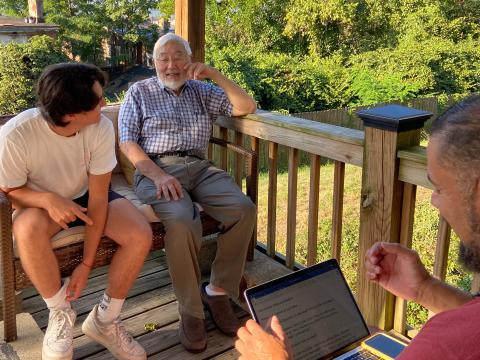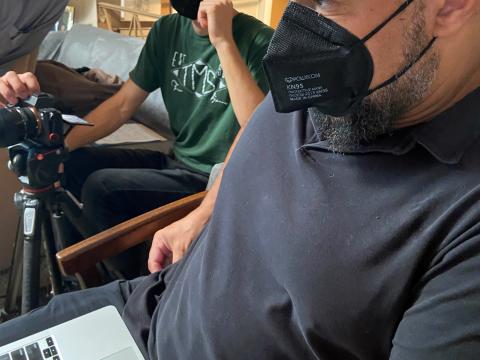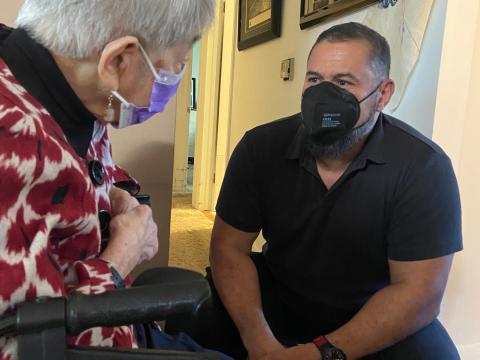J. Reid Miller on Inheritance, Family, and Identity
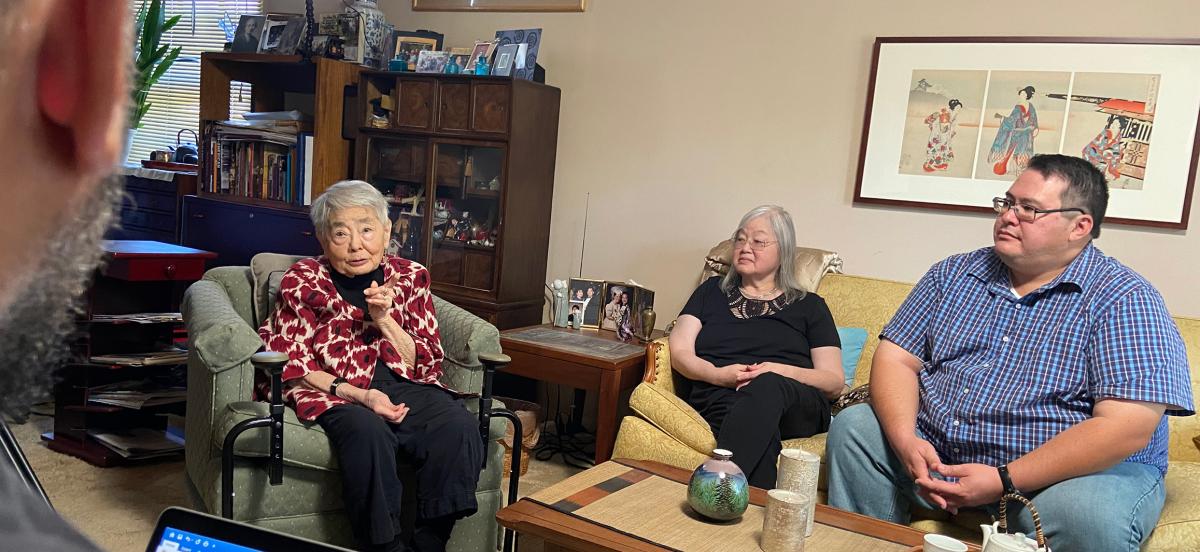
J. Reid Miller (photographed from behind) interviews Kiyo Fujiu, her daughter, and grandson for a scene in the documentary 80 Years Later.
Details
The associate professor of philosophy discusses writing and producing 80 Years Later, a new documentary about racial inheritance and Japanese American incarceration.
Though J. Reid Miller is known on the Haverford campus as an associate professor of philosophy, he actually began his academic journey as a filmmaker. After earning his B.A. in film studies and psychology from Yale, he completed a master’s in experimental film theory and production from the University of Iowa, where he made non-narrative shorts and documentaries before pursuing his Ph.D. at UC Santa Cruz. Recently, though, he returned to his filmmaking roots as the writer and producer of a new documentary, 80 Years Later, which is actually focused on the idea of roots. By exploring the “racial inheritance” of a family of Japanese Americans, the film seeks to understand “how the internment of Japanese during World War II affected their self-understanding as Japanese Americans, and how that imprisonment produced a legacy of racial identification in their children and grandchildren,” said Miller, who studies racial inheritance and teaches a class on it at Haverford.
The film takes its name from the length of time since President Roosevelt’s Executive Order 9066, which imprisoned 120,000 Japanese Americans following the attack on Pearl Harbor, and it follows the Shimizu and Fujiu families in Chicago and Cincinnati, branches of a shared family tree that had roots in the Bay Area prior to World War II. (Robert Shimizu and his cousin Kiyo Fujiu were both imprisoned in internment camps when they were young.) Via interviews with three generations of family members, the filmmakers explore the legacy of that traumatic incarceration as it reverberates beyond those who lived it through their children and grandchildren.
Ahead of the film’s May 12 premiere at the Los Angeles Asian Pacific Film Festival, we spoke with Miller about his role on the film, his research on racial inheritance, and how, exactly, one “writes” a documentary.
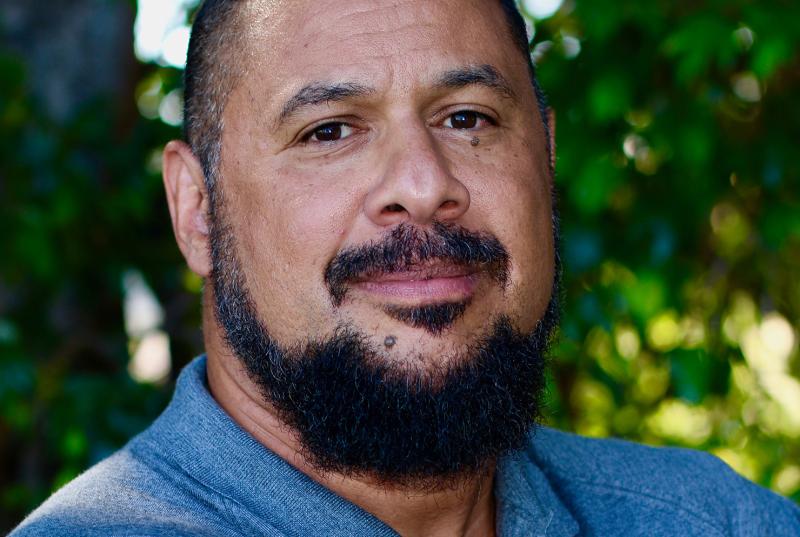
Why are you interested in the idea of inheritance, and what can this film teach us about it?
JRM: One could reasonably claim that inheritance has increasing importance in our current era, from debates about legacy college admissions, birthright citizenship, wealth disparity, and racial reparations. As I argue in my book, Stain Removal: Ethics and Race (Oxford, 2016), we are historically very conflicted about ourselves as "terminal points" along inheritable lines of transfer. We want to believe that the destinies, social worth, and successes and failures of individuals should ideally be the result of their own self-making. Yet we also clamor to take ancestry tests and trace our genealogies in order to discover the truth of "who we are," explain our work ethic, civic values, and addictions as a consequence what "runs in our family," and justify opportunities, entitlements, and wealth as what we have a right to in virtue of our involuntary inheritances. What the film teaches us, in part, is that seemingly unimpeachable values like freedom, equality, and individuality contradict much of how we find meaning in our lives, and as such risk masking the complex and multiple lines of inheritance through which we are able to understand ourselves at all.
Can you tell me a little bit about your roles on the film and what a documentary’s writer actually does?
JRM: In a literal sense, I composed the questions in conjunction with the director and conducted the interviews. When we were editing the piece, however, we knew we wanted it to foster a deeper connection with the audience. We wanted viewers to ask themselves, "What stories am I responsible for continuing? What values are being passed down through me?" These are questions that apply not only to family, but to all of our relational inheritances like race, nationality, and sexual identity, as well as our professional, neighborhood, and cultural practices. In the midst of the editing, the director suggested intertitles as a way to solicit the audience and their own legacies into the film's tension. So immediately after that meeting, I jumped on a plane back to Philly and spent six hours in the air conceiving and writing the film's intertitles, taking the very language the family uses in their conversations to pose questions to the audience at key transition points in the story.
What was it like conducting those interviews in person?
JRM: It's hard to describe the experience. For me, it's an adrenaline rush. I'm sitting less than six feet from the interviewees, with the main camera over one shoulder and the director perched behind the other. You have to listen intently to the interviewees, keenly attuned to their body language, yet also be aware of how others in the room (including the crew) are responding, while simultaneously translating the notes the director is putting in your ear throughout. Even with the pre-interview, the narrative never unfolds like you expect; I love those moments of an unanticipated phrasing or seemingly off-handed yet evocative comment. I treat these as openings where the interviewee is perhaps testing a new way of making sense of their experiences, and I really try to support and encourage those experimental turns. I want the interviewee always to feel affirmed after the conversation. At the same time, the clock is ticking and the shooting schedule is tight, and you know you have to walk away with usable footage. It's one of the rare experiences I've had where every sensory capacity is fully engaged and alert—like riding a motorcycle in fast traffic.
What are you hoping audiences take away from the film?
JRM: I'm hoping audience members see that "who they are" is indissociable from those who come before and after—that they are conduits and carriers of ways of thinking and behaving much larger than anything that could be called a "personal" choice or preference. But I also want to give them a vocabulary to talk about those legacies, so that they can contemplate their role as an inheritor not as restricting who they are but as what makes them a part of something much larger and more meaningful.
Why did you want to tell this story or be a part of telling it?
JRM: To be Black has always meant having a fraught relationship with inheritance. The violent severing and rerouting of legacies of traditions, knowledges, practices, and languages as a consequence of slavery and colonialism thus became itself a feature of Black inheritance. That is to say, Blackness examples the cruel impossibility of the modern fantasy of the autonomous political individual whose selfhood, success, and "freedom" owes nothing to anyone. This has been an extremely challenging dynamic to unravel for myself and my work, and it cannot take place, I think, without examining the related U.S. and global legacies—like those of Japanese Americans—that race has clipped and redirected in the name of liberation, individual rights, and personal ethics.
How has working on this film affected your teaching, if at all?
JRM: More than anything, working on this film has reaffirmed for me the value of faculty research for the sake of excellent pedagogy. Everything I learned in this deep dive into the history of Japanese internment and, more specifically, its iterative and various manifestations for a massive racial diaspora were continually woven back into the syllabus and teaching of this seminar [on inheritance] and my other courses. Whereas almost all writing on inheritance emphasizes material and resource transfers along family lines, participating in the research and shooting of the film disclosed for me how inheritance governs all relations of identity and collectivity, and how we continually rewrite and rethink ourselves through these associations. Inheritance, in short, is not a simple transfer between already existing individuals; rather, it names an ongoing process by which the individual's declaration that "This is me!" is always at the same time a claim to several collective lineages. There is no way I would have been able to bring myself and the class to a forward-thinking and transformative grasp of inheritance without the time to engage in this project.
I was particularly struck by the final series of intertitle questions of the film, which ask, among other things, "Is assimilation what it feels like to belong?" and "Is equity what it feels like to belong?" Do you have answers for such questions?
JRM: In the spirit of the liberal arts, I'm always more interested in how a question produces new possible interpretations rather than in finding an answer that shuts down other possibilities. That said, how a question is framed already constitutes a kind of answer, as it defines in advance possible responses. For instance, when Japanese Americans left the internment camps, "belongingness" was construed as assimilation to normative white racial values. Yet for their grandchildren, "belongingness" is framed as equity: one "belongs" in virtue of having equal access to institutional resources and opportunities. My aim was to show that belonging is not a state we comfortably inhabit, but instead an incongruous orientation to an always temporally shifting set of conditions. This is, I suspect, generally the case, no matter how much we feel that some people fully "belong" while others remain outsiders. This is because, as the questions suggest, belongingness is as much a felt status as a factual condition. This is why I find the genre of teen films so fascinating—the characters are obsessed with belonging: who belongs, who doesn't, and how to act as if you belong in order to then feel like you belong. But the ending is always the same: the teens discover—surprise!—that nobody feels like they belong. The experience of non-belonging, it turns out, is paradoxically indissociable from what it means to belong. I of course had to include that in the intertitles as well.
Now that you’ve worked on your first film in decades, will you make more?
JRM: The director of 80 Years Later, Celine Parreñas Shimizu, and I have had a few conversations about future projects, but nothing concrete. Now that I've come back to film after being away for so many years it's difficult to imagine leaving it all behind again. As a theorist, I appreciate the intense, steady work of reflective analysis and writing—but secretly I'm also a thrill-seeker, so another film feels inevitable.
80 Years Later premieres May 12 at the Los Angeles Asian Pacific Film Festival. Watch scenes from the film and learn more about it at 80yearslater.film.
